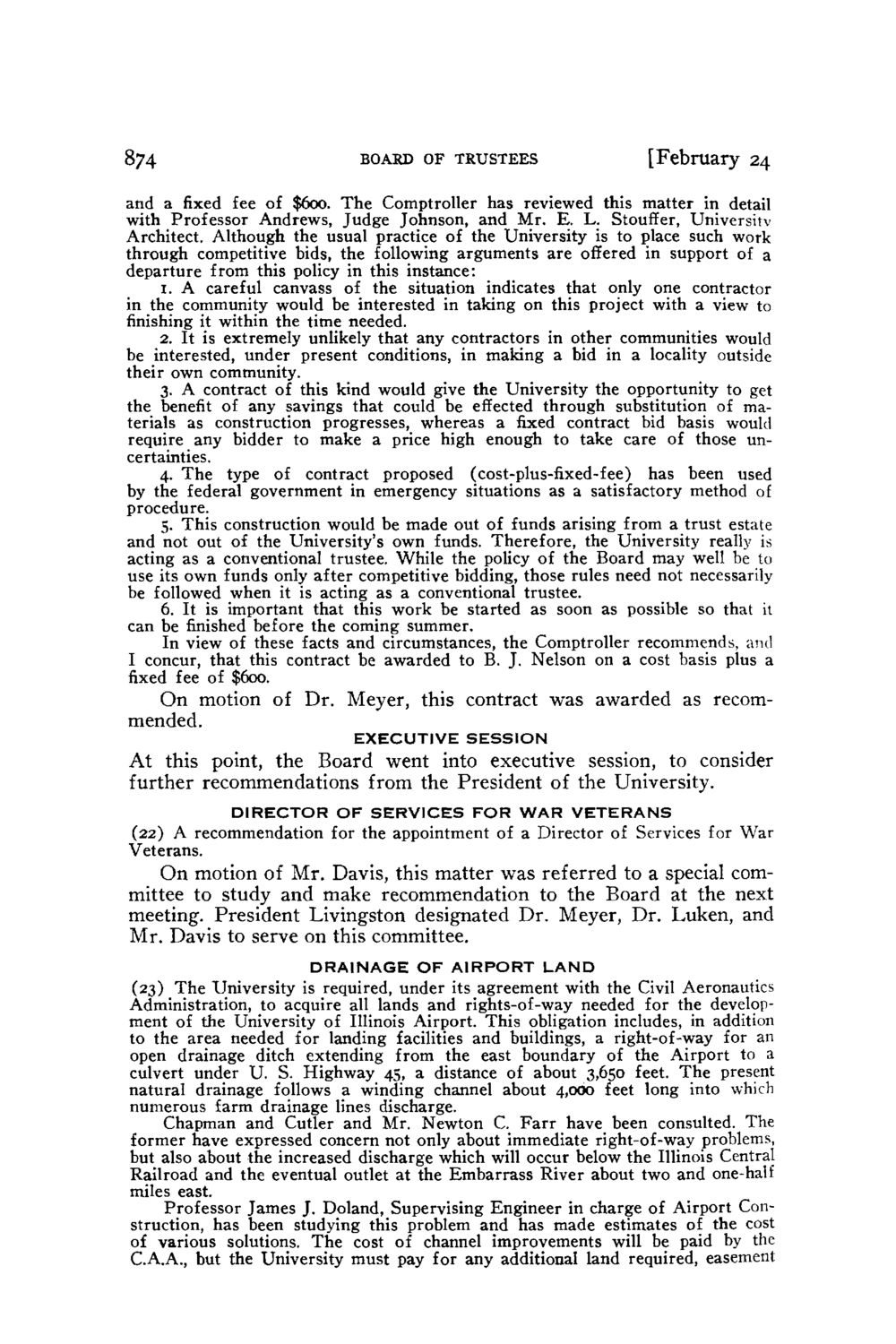| |
| |
Caption: Board of Trustees Minutes - 1944
This is a reduced-resolution page image for fast online browsing.

EXTRACTED TEXT FROM PAGE:
874 BOARD OF TRUSTEES [February 24 and a fixed fee of $600. T h e Comptroller has reviewed this matter in detail with Professor Andrews, Judge Johnson, and Mr. E. L. Stouffer, Universitv Architect. Although the usual practice of the University is to place such work through competitive bids, the following arguments are offered in support of a departure from this policy in this instance: 1. A careful canvass of the situation indicates that only one contractor in the community would be interested in taking on this project with a view to finishing it within the time needed. 2. It is extremely unlikely that any contractors in other communities would be interested, under present conditions, in making a bid in a locality outside their own community. 3. A contract of this kind would give the University the opportunity to get the benefit of any savings that could be effected through substitution of materials as construction progresses, whereas a fixed contract bid basis would require any bidder to make a price high enough to take care of those uncertainties. 4. T h e type of contract proposed (cost-plus-fixed-fee) has been used by the federal government in emergency situations as a satisfactory method of procedure. 5. This construction would be made out of funds arising from a trust estate and not out of the University's own funds. Therefore, the University really is acting as a conventional trustee. While the policy of the Board may well be to use its own funds only after competitive bidding, those rules need not necessarily be followed when it is acting as a conventional trustee. 6. It is important that this work be started as soon as possible so that it can be finished before the coming summer. In view of these facts and circumstances, the Comptroller recommends, and I concur, that this contract be awarded to B. J. Nelson on a cost basis plus a fixed fee of $600. O n m o t i o n of D r . M e y e r , t h i s c o n t r a c t w a s a w a r d e d a s r e c o m mended. EXECUTIVE SESSION At this point, the Board went into executive session, to consider further recommendations from the President of the University. DIRECTOR OF SERVICES FOR WAR VETERANS (22) A recommendation for the appointment of a Director of Services for War Veterans. O n m o t i o n of M r . D a v i s , this m a t t e r w a s r e f e r r e d to a special committee t o s t u d y a n d m a k e r e c o m m e n d a t i o n to t h e B o a r d at t h e n e x t meeting. President Livingston designated Dr. Meyer, Dr. Luken, and M r . Davis to serve on this committee. DRAINAGE OF AIRPORT LAND (23) T h e University is required, under its agreement with the Civil Aeronautics Administration, to acquire all lands and rights-of-way needed for the development of the University of Illinois Airport. This obligation includes, in addition to the area needed for landing facilities and buildings, a right-of-way for an open drainage ditch extending from the east boundary of the Airport to a culvert under U. S. Highway 45, a distance of about 3,650 feet. T h e present natural drainage follows a winding channel about 4,000 feet long into which numerous farm drainage lines discharge. Chapman and Cutler and Mr. Newton C. F a r r have been consulted. The former have expressed concern not only about immediate right-of-way problems, but also about the increased discharge which will occur below the Illinois Central Railroad and the eventual outlet at the Embarrass River about two and one-half miles east. Professor James J. Doland, Supervising Engineer in charge of Airport Construction, has been studying this problem and has made estimates of the cost of various solutions. T h e cost of channel improvements will be paid by the C.A.A., but the University must pay for any additional land required, easement
| |